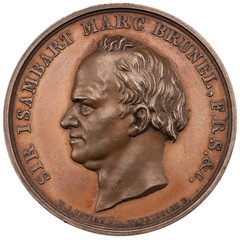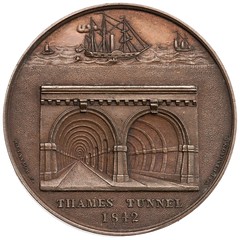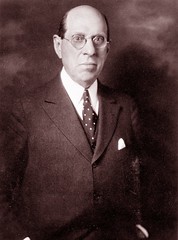
PREV ARTICLE
NEXT ARTICLE
FULL ISSUE
PREV FULL ISSUE
ROBERT EIDLITZ AND HIS BOOK ON ARCHITECT MEDALS
American Numismatic Society Librarian David Hill published an article in the 2015 Issue 4 of the ANS Magazine on author Robert
Eidlitz. With permission, here is a short excerpt from Robert Eidlitz: He Wrote the Book on Architect Medals. -Editor
Marc Eidlitz was the father of Robert Eidlitz (1864–1935), a member of the ANS’s governing council and a collector of the medals that would serve as the foundation of his grand and weighty (literally—it weighs 11 pounds) book, Medals and Medallions Relating to Architects (1927). With two minor exceptions, it was all he ever published, but it was enough to bring recognition in the form of the Society’s Archer Milton Huntington Medal, the committee in charge proclaiming that, “This year the award is made not for a long list of publications, but for a single book of such high quality as to merit this distinction. It is made not only for scholarship, painstaking research, and clarity of arrangement, but for its impressive form, for its dignified printing, and for the excellent arrangement of its plates.” It’s not exactly clear when Robert Eidlitz began collecting his medals, but it’s no mystery how he arrived at his subject matter: he was born to it. His father Marc, a shopkeeper’s son raised in the Jewish ghetto of Prague, came to New York in 1847 at the age of 21, where he quickly secured an apprenticeship with a builder. By 1854 he had started his own construction firm, finding great success in the expanding city, erecting churches, synagogues, hospitals, and commercial buildings for clients such as Lord & Taylor and Steinway. Marc Eidlitz & Son was not an architectural firm but rather a construction company that also did general contracting work. Robert, though he had studied architecture at Cornell and the Royal Polytechnic in Berlin, was himself was not really an architect. This was made most explicitly clear during a court case that arose over a payment dispute, where it was stated that, though he was “perhaps the most prominent builder in New York,” he was not officially an architect. In the 1920s, his firm built an addition to the ANS’s Audubon Terrace building. Known as West Hall, it was designed by the architect Henry Brooks Price. Robert split his time between his home on Park Avenue, which kept him close to his business, and his estate in Westchester County at Dobbs Ferry, where he could relax and turn his attention to gardening and golf. Numismatics was his primary passion, and letters in the ANS Archives attest to the endless hours he spent buying medals and gathering information about them, building his collection of about 5,400 pieces and working on his book, which took 12 years to write. Though his was the first, and so far only, such work on the narrow topic of medals relating to architects, his idea of grouping numismatic items around a given theme is, of course, not unique. A modern example would be the catalog of numismatic items pertaining to ophthalmology, optics, and vision, Ophthalmologia: Optica et Visio in Nummis, by Jay Galst and Peter van Alfen. ANS curator Howland Wood compared Eidlitz’s book with a then recently published work on naval medals by the Marquis of Milford Haven: “you have him licked in all ways, in all directions.” The oversized book (12 x 16 inches) was privately printed in an edition of 150, 10 with special morocco covering for presentation, and was sold to the general public for $25 each. It contains descriptions of 1,145 medals, most from his own collection and most with photographs, covering about 550 architects. Desiring to “make the arrangement as pleasing as possible,” he took great care in the layout of the plates, forgoing a strict numeric sequence in favor of esthetic considerations. He distributed many to his friends and associates. J. P. Morgan thanked him for a copy. John D. Rockefeller Jr., upon receipt of the “monumental work,” expressed surprise at Eidlitz’s secret hobby.  
Great Britain. Marc Isambard Brunel, Opening of Thames Tunnel. Bronze medal by William Joseph Taylor, 1842. Eidlitz 143 The Society mounted a highly successful exhibit of Eidlitz’s collection in 1940, five years after his passing. A private viewing brought 114 people to Audubon Terrace to see it, attendance having been boosted by a “brief but approximately correct notice . . . in the New York Times.” There was some unanticipated excitement at the event. An official memorandum to the ANS council noted that “the occasion was made memorable by the arrival of the Police Bomb Squad.” This was followed by even more “squads of police,” sent to investigate a phoned-in threat. A great effort was made to calm the guests, including Robert’s wife, Sadie, though it appears there was never any real cause for alarm. ANS president Edward Newell, it was reported, was successful in convincing the police captain to keep the entire matter out of the newspapers. For more information on the American Numismatic Society, see:
Wayne Homren, Editor The Numismatic Bibliomania Society is a non-profit organization promoting numismatic literature. See our web site at coinbooks.org. To submit items for publication in The E-Sylum, write to the Editor at this address: whomren@gmail.com To subscribe go to: https://my.binhost.com/lists/listinfo/esylum All Rights Reserved. NBS Home Page Contact the NBS webmaster 
|
